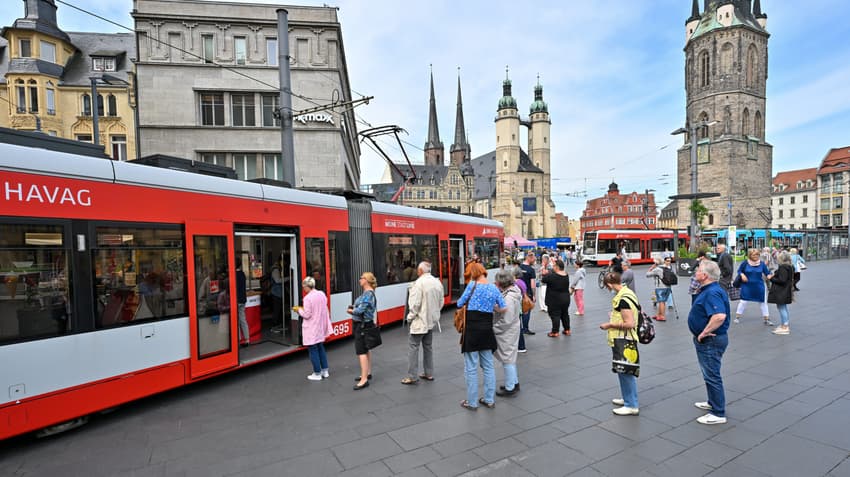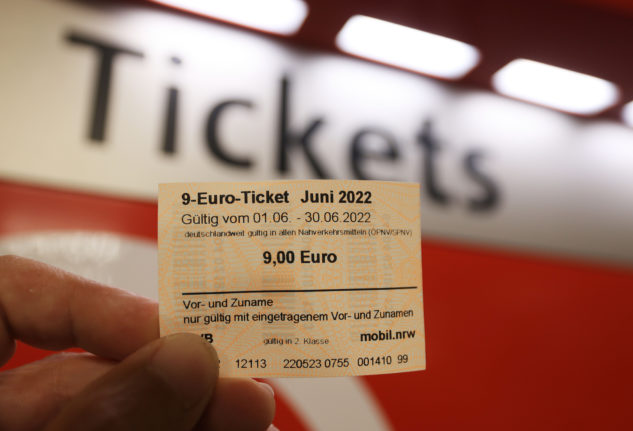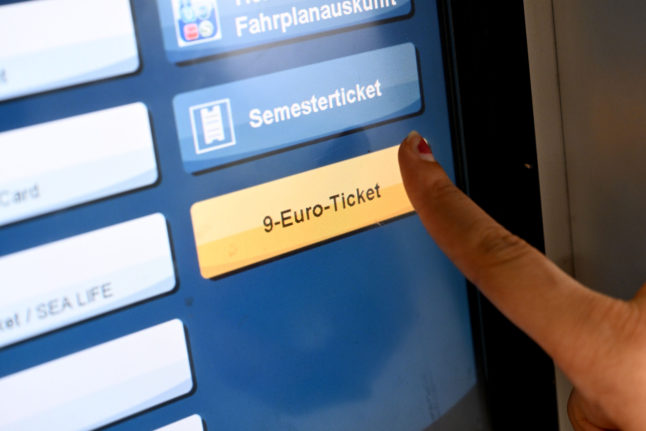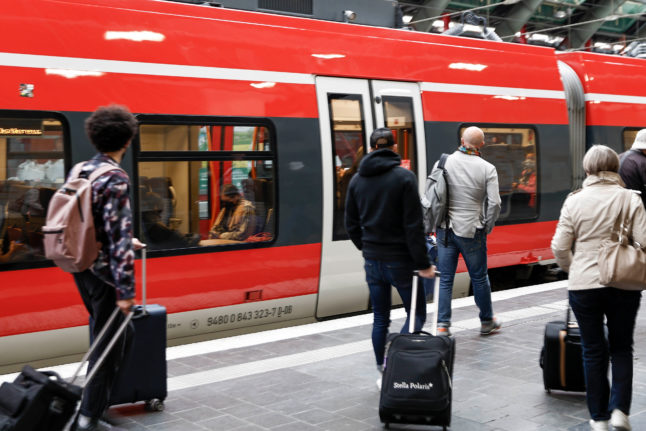OPINION: Germany's €9 ticket for summer is just a gimmick, not a solution

Germany is launching a cheap transport deal in response to rising energy costs. But the flashy offer may actually lead to sharp fare hikes and is not what's needed in Germany, argues Brian Melican.
When someone faces constant criticism about one of their character traits, they sometimes react by over-correcting it. In Germany, we’re witnessing the political equivalent of this with the introduction of the nationwide €9 monthly ticket for local transport on June 1st. Yes, after years of being told that it is plodding, excessively risk-averse, and beholden to the automotive industry, Germany’s political class has decided to show that it can do daring, diesel-independent decision-making – and gone completely overboard. It’s like at the end of Grease when Sandy turns up wearing a cat-suit.
The problem for the German government, however, is that while Sandy looked legendarily hot in her outfit, Olaf Scholz’ Tripartite Coalition is set to appear decidedly less attractive (but just as uncomfortable) in its black leather headline-catcher. That’s because, in my view, the €9 ticket will prove to be completely ineffective at best and, at worst, a small-scale disaster.
I know I’m in the vast minority here. Most people in Germany are currently either neutral or indeed wholly favourable towards the policy. Millions have already purchased their tickets and are now happily planning itineraries which, by relying solely on the regional trains covered by the offer, will take them hundreds of miles for less than it usually costs to cross a medium-sized city. Millions more convinced car-drivers, meanwhile, have absolutely no intention of leaving their vehicles at home, but are hoping that the crazily cheap tickets will take some traffic off the roads. What is more, after almost three years of sustained fiscal laxity in the face of continuous crises, all of us have become accustomed to the prospect of millions of euros of public money being lavished on the policy.

A passenger holds an example of the €9 ticket in Cologne. Photo: picture alliance/dpa | Oliver Berg
READ ALSO:
- €9 for 90: Everything. you need to know about Germany’s cheap travel deal
- How to explore Germany by train with the €9 ticket
What is the German government really trying to achieve?
All of us, however – especially those of us who, like me, have relied on public transport all our lives (I never even learned to drive a car) – would do well to not get caught up in all the general enthusiasm and think more closely about the stated aims of the €9 Ticket and whether it will achieve them.
Firstly, the stated aims are unclear. For the Greens, it’s about luring people away from their cars, a kind of ‘cut-price trial offer’ to reach people who, thus far, would never have considered taking the bus or who retreated back into their motorised cocoons at the start of corona. For the SPD, the primary focus is on giving a cash boost to hard-pressed lower-income workers who, unlike white-collar employees, are more likely to have to actually travel to their place of work and less likely to own a car. The FDP, meanwhile, aren’t really wedded to the policy for any reason, but seem happy enough to go along with it because it provides them with an eco-friendly alibi while they throw millions more at car-drivers in terms of fuel tax breaks – and because looks like the kind of gutsy, “move fast and break things”-style policy approach they’re always claiming they stand for.
These are aims the €9 ticket will not be able to achieve – or only at the cost of various unintended consequences. For a start, yes, existing holders of monthly season tickets will indeed get a cash break: here in Hamburg, commuters who need the full use of all zones stand to save at least €200 over three months. Yet equally, the millions of ‘joy-riders’ who see this as their ticket to cheap weekends away or a budget domestic summer holiday will also be benefitting from hefty subsidies. Many of them could well have afforded the standard fare. Moreover, many season-ticket holders are, despite galloping inflation, not yet in dire financial straits. As such, a lot of the spending will inevitably be wasted on those who have absolutely no need of it.

The €9 ticket option on a ticket machine in Munich. Photo: picture alliance/dpa | Felix Hörhager
Proof of the fact that many users of public transport in Germany do not really need a fare reduction can be found by simply looking at trains and buses in major urban centres: they are full of paying riders. Even though German public transport has no ticket barriers and only sporadic fare checks, rates of fare evasion are low; and even in a global pandemic which has turned a good half of the population into paranoid recluses, ridership is already back up to 80 percent of pre-corona levels. Of course, 80 percent is still too little for cash-strapped public transport authorities, many of whom are welcoming the ticket on the grounds that it will help them get back to 2019 – but does anyone remember what 2019 buses and trains were like? Horribly overcrowded! There is something slightly schizophrenic going on here: while the Health Ministry is saying that public transport is still so dangerous that it is one of the last non-clinical environments in which face masks must remain compulsory, the Transport Ministry is enacting a policy which might as well be subtitled “Just keep packin’ ‘em in…” Poor Karl Lauterbach must be having a fit.
READ ALSO: Germany's current Covid mask rules
Overcrowding and rising fares
Indeed, overcrowding is another area in which the policy is likely to backfire, both by angering regular users whose seats are now being taken by €9-newbies and by giving said €9 ticket-holders a somewhat sub-optimal user experience as they, packed in like sardines, suddenly remember why they never used to like the bus anyway. There will no doubt be an inevitable slew of tweets from travellers posting photos of overcrowded regional trains in which the air conditioning systems have failed, captioned – depending on the character of the user – with either sardonic jibes or histrionic accusations of Covid-irresponsibility. Certainly, the effect for the image of public transport is unlikely to be quite what the Greens were hoping for…
There is potential for an even more spectacular PR disaster, however: a hefty fare-hike in September or January 2023 at the latest. With inflation soaring, one is due anyway, and after three months’ lost revenue from normal ticket sales which the federal Government has only vaguely promised to reimburse, many transport authorities may well have to try and recoup costs from those passengers who still have to keep using buses and trains even after the summer bonanza is over. That, under car-friendly FDP stewardship, the Transport Ministry will be stingy when it comes to paying local transport authorities for its policy is, by the way, almost certain: it is already starting to renege on commitments in last year’s coalition agreement to support infrastructure investment.
READ ALSO: German public transport costs 'will rise steeply after €9 offer', says operator

Travellers queue for a regional train at Berlin's Ostbahnhof. Transport operators are expecting crowded trains during the cheap transport offer. Photo: picture alliance/dpa | Carsten Koall
So in a worst-case scenario, the €9-ticket splurge could halt investment this summer as local transport authorities freeze budgets until they can put a figure on the damage, and then hamper it in the long term as gaping accounting holes have to be retrospectively plugged. This would completely counter the stated aim of getting more people onto public transport because many who would, in principle, be willing to use it are lacking suitable options near their homes or places of work. Whole areas of Hamburg are miles from the U-Bahn, for instance, while entire medium-sized cities like Münster and Kiel rely solely on chronically overloaded busses. The only thing that will fix this, however, is buying vehicles, laying tracks, and training drivers – i.e. concerted investment over years, not temporary fare gimmicks.
How could Germany approach it differently?
In terms of putting money in people’s pockets, but doing it in a sensible, targeted way, why not introduce the €9 ticket for low-income households, and/or specifically for groups such as students and pensioners – but do so on a permanent basis? It could even be extended to every household which doesn’t own a car: if we’re going to throw money at people for using public transport, we might at least chuck it in the direction of those who lessen the load on the exchequer in another way – i.e. by not causing significant wear and tear to the country’s road network.
And if it’s a sexy, eye-catching policy you’re after, here’s one that would cost nothing and encourage some of the missing 20 percent to return to public transport: ending the ridiculous mask requirement. It’s absurd that trade fairs with tens of thousands of visitors are now being held (with no detrimental effect on public health), but that those travelling to the crowded expo halls by bus or train have to mask up. The messaging is wrong and so people are wrongly afraid of public transport or discouraged from using it by the prospect of the dreaded FFP2s. Yes, getting rid of Covid masks on public transport would, on the Grease-policy-sexiness scale, rate as Olivia Newton-John. The €9 ticket is one of the supporting actresses doomed to quickly be forgotten.
READ ALSO: Why Germany's energy relief payouts are no fix for inadequate social security
Comments (2)
See Also
When someone faces constant criticism about one of their character traits, they sometimes react by over-correcting it. In Germany, we’re witnessing the political equivalent of this with the introduction of the nationwide €9 monthly ticket for local transport on June 1st. Yes, after years of being told that it is plodding, excessively risk-averse, and beholden to the automotive industry, Germany’s political class has decided to show that it can do daring, diesel-independent decision-making – and gone completely overboard. It’s like at the end of Grease when Sandy turns up wearing a cat-suit.
The problem for the German government, however, is that while Sandy looked legendarily hot in her outfit, Olaf Scholz’ Tripartite Coalition is set to appear decidedly less attractive (but just as uncomfortable) in its black leather headline-catcher. That’s because, in my view, the €9 ticket will prove to be completely ineffective at best and, at worst, a small-scale disaster.
I know I’m in the vast minority here. Most people in Germany are currently either neutral or indeed wholly favourable towards the policy. Millions have already purchased their tickets and are now happily planning itineraries which, by relying solely on the regional trains covered by the offer, will take them hundreds of miles for less than it usually costs to cross a medium-sized city. Millions more convinced car-drivers, meanwhile, have absolutely no intention of leaving their vehicles at home, but are hoping that the crazily cheap tickets will take some traffic off the roads. What is more, after almost three years of sustained fiscal laxity in the face of continuous crises, all of us have become accustomed to the prospect of millions of euros of public money being lavished on the policy.

READ ALSO:
- €9 for 90: Everything. you need to know about Germany’s cheap travel deal
- How to explore Germany by train with the €9 ticket
What is the German government really trying to achieve?
All of us, however – especially those of us who, like me, have relied on public transport all our lives (I never even learned to drive a car) – would do well to not get caught up in all the general enthusiasm and think more closely about the stated aims of the €9 Ticket and whether it will achieve them.
Firstly, the stated aims are unclear. For the Greens, it’s about luring people away from their cars, a kind of ‘cut-price trial offer’ to reach people who, thus far, would never have considered taking the bus or who retreated back into their motorised cocoons at the start of corona. For the SPD, the primary focus is on giving a cash boost to hard-pressed lower-income workers who, unlike white-collar employees, are more likely to have to actually travel to their place of work and less likely to own a car. The FDP, meanwhile, aren’t really wedded to the policy for any reason, but seem happy enough to go along with it because it provides them with an eco-friendly alibi while they throw millions more at car-drivers in terms of fuel tax breaks – and because looks like the kind of gutsy, “move fast and break things”-style policy approach they’re always claiming they stand for.
These are aims the €9 ticket will not be able to achieve – or only at the cost of various unintended consequences. For a start, yes, existing holders of monthly season tickets will indeed get a cash break: here in Hamburg, commuters who need the full use of all zones stand to save at least €200 over three months. Yet equally, the millions of ‘joy-riders’ who see this as their ticket to cheap weekends away or a budget domestic summer holiday will also be benefitting from hefty subsidies. Many of them could well have afforded the standard fare. Moreover, many season-ticket holders are, despite galloping inflation, not yet in dire financial straits. As such, a lot of the spending will inevitably be wasted on those who have absolutely no need of it.

Proof of the fact that many users of public transport in Germany do not really need a fare reduction can be found by simply looking at trains and buses in major urban centres: they are full of paying riders. Even though German public transport has no ticket barriers and only sporadic fare checks, rates of fare evasion are low; and even in a global pandemic which has turned a good half of the population into paranoid recluses, ridership is already back up to 80 percent of pre-corona levels. Of course, 80 percent is still too little for cash-strapped public transport authorities, many of whom are welcoming the ticket on the grounds that it will help them get back to 2019 – but does anyone remember what 2019 buses and trains were like? Horribly overcrowded! There is something slightly schizophrenic going on here: while the Health Ministry is saying that public transport is still so dangerous that it is one of the last non-clinical environments in which face masks must remain compulsory, the Transport Ministry is enacting a policy which might as well be subtitled “Just keep packin’ ‘em in…” Poor Karl Lauterbach must be having a fit.
READ ALSO: Germany's current Covid mask rules
Overcrowding and rising fares
Indeed, overcrowding is another area in which the policy is likely to backfire, both by angering regular users whose seats are now being taken by €9-newbies and by giving said €9 ticket-holders a somewhat sub-optimal user experience as they, packed in like sardines, suddenly remember why they never used to like the bus anyway. There will no doubt be an inevitable slew of tweets from travellers posting photos of overcrowded regional trains in which the air conditioning systems have failed, captioned – depending on the character of the user – with either sardonic jibes or histrionic accusations of Covid-irresponsibility. Certainly, the effect for the image of public transport is unlikely to be quite what the Greens were hoping for…
There is potential for an even more spectacular PR disaster, however: a hefty fare-hike in September or January 2023 at the latest. With inflation soaring, one is due anyway, and after three months’ lost revenue from normal ticket sales which the federal Government has only vaguely promised to reimburse, many transport authorities may well have to try and recoup costs from those passengers who still have to keep using buses and trains even after the summer bonanza is over. That, under car-friendly FDP stewardship, the Transport Ministry will be stingy when it comes to paying local transport authorities for its policy is, by the way, almost certain: it is already starting to renege on commitments in last year’s coalition agreement to support infrastructure investment.
READ ALSO: German public transport costs 'will rise steeply after €9 offer', says operator

So in a worst-case scenario, the €9-ticket splurge could halt investment this summer as local transport authorities freeze budgets until they can put a figure on the damage, and then hamper it in the long term as gaping accounting holes have to be retrospectively plugged. This would completely counter the stated aim of getting more people onto public transport because many who would, in principle, be willing to use it are lacking suitable options near their homes or places of work. Whole areas of Hamburg are miles from the U-Bahn, for instance, while entire medium-sized cities like Münster and Kiel rely solely on chronically overloaded busses. The only thing that will fix this, however, is buying vehicles, laying tracks, and training drivers – i.e. concerted investment over years, not temporary fare gimmicks.
How could Germany approach it differently?
In terms of putting money in people’s pockets, but doing it in a sensible, targeted way, why not introduce the €9 ticket for low-income households, and/or specifically for groups such as students and pensioners – but do so on a permanent basis? It could even be extended to every household which doesn’t own a car: if we’re going to throw money at people for using public transport, we might at least chuck it in the direction of those who lessen the load on the exchequer in another way – i.e. by not causing significant wear and tear to the country’s road network.
And if it’s a sexy, eye-catching policy you’re after, here’s one that would cost nothing and encourage some of the missing 20 percent to return to public transport: ending the ridiculous mask requirement. It’s absurd that trade fairs with tens of thousands of visitors are now being held (with no detrimental effect on public health), but that those travelling to the crowded expo halls by bus or train have to mask up. The messaging is wrong and so people are wrongly afraid of public transport or discouraged from using it by the prospect of the dreaded FFP2s. Yes, getting rid of Covid masks on public transport would, on the Grease-policy-sexiness scale, rate as Olivia Newton-John. The €9 ticket is one of the supporting actresses doomed to quickly be forgotten.
READ ALSO: Why Germany's energy relief payouts are no fix for inadequate social security
Join the conversation in our comments section below. Share your own views and experience and if you have a question or suggestion for our journalists then email us at [email protected].
Please keep comments civil, constructive and on topic – and make sure to read our terms of use before getting involved.
Please log in here to leave a comment.